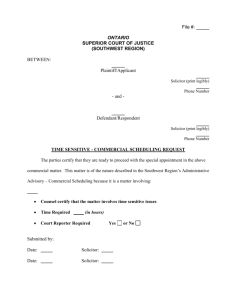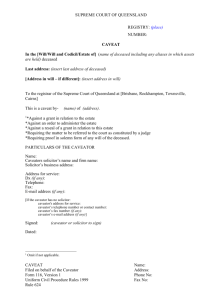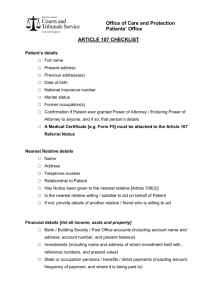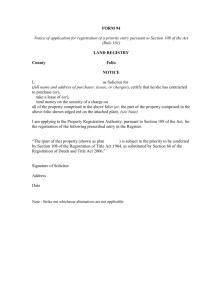the Law Society's governance website
advertisement
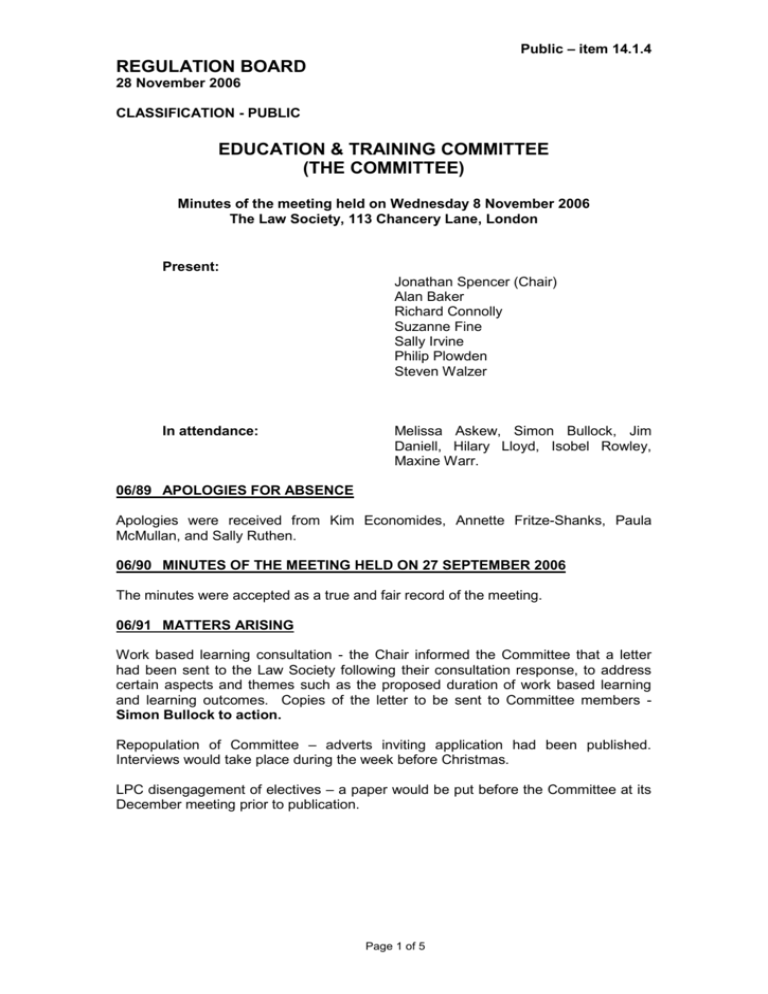
Public – item 14.1.4 REGULATION BOARD 28 November 2006 CLASSIFICATION - PUBLIC EDUCATION & TRAINING COMMITTEE (THE COMMITTEE) Minutes of the meeting held on Wednesday 8 November 2006 The Law Society, 113 Chancery Lane, London Present: Jonathan Spencer (Chair) Alan Baker Richard Connolly Suzanne Fine Sally Irvine Philip Plowden Steven Walzer In attendance: Melissa Askew, Simon Bullock, Jim Daniell, Hilary Lloyd, Isobel Rowley, Maxine Warr. 06/89 APOLOGIES FOR ABSENCE Apologies were received from Kim Economides, Annette Fritze-Shanks, Paula McMullan, and Sally Ruthen. 06/90 MINUTES OF THE MEETING HELD ON 27 SEPTEMBER 2006 The minutes were accepted as a true and fair record of the meeting. 06/91 MATTERS ARISING Work based learning consultation - the Chair informed the Committee that a letter had been sent to the Law Society following their consultation response, to address certain aspects and themes such as the proposed duration of work based learning and learning outcomes. Copies of the letter to be sent to Committee members Simon Bullock to action. Repopulation of Committee – adverts inviting application had been published. Interviews would take place during the week before Christmas. LPC disengagement of electives – a paper would be put before the Committee at its December meeting prior to publication. Page 1 of 5 Public – item 14.1.4 REGULATION BOARD 28 November 2006 06/92 EDUCATION AND TRAINING UNIT REPORT (agenda item 4) Hilary Lloyd clarified the item in the report on character and suitability cases. Applications were not rejected outright on the basis of character and suitability issues, as they had to go through the adjudication process. Character and suitability guidelines were in place and working well, and were intended to go to consultation later in the year. 06/93 WHAT IS A SOLICITOR (agenda item 5) Hilary Lloyd introduced the paper, which outlined the key milestones throughout a solicitor’s career. It highlighted issues over the current requirements, such as the need for three practising certificates to be held before a solicitor could set up in practice on their own account. The work based learning project was clearly related to this, as had become apparent during a recent meeting with Human Assets, the wbl consultants. Human Assets were going to use the day one outcomes developed during the TFR as background and a starting point for their research. Work based learning could not be viewed in isolation from the day one outcomes. Some of the firms that Human Assets had spoken to had expressed concerns at the agreement and approval process for the day one outcomes – some were unaware of them altogether. There would be another meeting with the consultants to refocus their work and a broader ‘cradle to grave’ project on ‘what is a solicitor’ would be undertaken in early 2007. The Committee raised the following issues in discussion: the need to link the requirements for setting up in practice with the Legal Services Bill; the profession needed to be aware of the day one outcomes work; the need to draw on the existing day one outcomes which were the product of previous work and consultation, but being prepared to modify them in the light of research – they should not be regarded as set in stone; the difficulty in quantifying some aspects of the ‘what is a solicitor’ proposals, such as ‘becoming a leader’; whether the objective ‘to maintain the rule of law’ covered rules of ethics and conduct; the need to be mindful of the different types of solicitor i.e. city, legal aid, medium sized firms; the difficulties of defining standards for heads of legal practice, due to alternative business structures and the range of management systems operating within law firms and their changing nature. The Chair requested that any further comments or thoughts should be sent to Hilary Lloyd and Jim Daniell. Page 2 of 5 Public – item 14.1.4 REGULATION BOARD 28 November 2006 The Committee agreed: the proposed framework for development of the standards; the approach to linking the development of standards with the wbl pilot project; the proposed timetable for developing the standards; A note would be sent inviting expressions of interest for two or three committee members to work with staff to develop the project specification and to select an appropriate supplier. 06/94 EDUCATION AND TRAINING OVERALL STRATEGY (agenda item 6) Jim Daniell gave a presentation to the Committee on his first impressions of the strategic context of the major E & T initiatives taking place and planned for the future. At present it was difficult to identify and express the strategic framework within which a great deal of positive and constructive work was taking place. And it was difficult to work out the extent to which the Training Framework Review (TFR) was meant to be informing what the Solicitors Regulation Authority (SRA) was currently doing in this field. There was a danger that without a strategic approach, there could be inconsistencies, gaps and difficulties over prioritising work with limited resources. It would also be difficult to communicate effectively if we could not justify initiatives and change on the basis of strategic objectives and outcomes that had been consulted upon and were publicly available. And a strategic plan would help ensure that research and consultation was carried out according to a logical timescale. An education and training strategy should be based in the Regulation Board’s strategy and principles of good regulation, drawing on the TFR where appropriate but not being constrained by it. The legal practice context needed to be taken into account, for example: the increasing trend towards specialisation, the different sizes of practice and the introduction of alternative business structures. Consumers and suppliers needed to be taken into account. The ‘what is a solicitor’ project will feed into the pre and post qualification part of the strategy. An example of a key post qualification issue was CPD which was treated as a ‘tickbox’ exercise: should we be relying more on the requirement for solicitors to be competent in the services they provide and focusing on a general developmental outcomes-based requirement rather than on hours completed? He was also conscious of confusion as to the purpose of accreditation schemes – was it for protection of consumers and the vulnerable, or was it a marketing exercise? Jim Daniell closed by saying he was not recommending starting from scratch. Instead, we could develop a strategic framework around what we are currently doing both to satisfy ourselves and to explain to others what we are doing. It would be possible to draft a strategy (which could be the subject of consultation) in time for the next committee meeting. The Committee discussed the presentation. It welcomed a strategic approach. The Committee noted: Page 3 of 5 Public – item 14.1.4 REGULATION BOARD 28 November 2006 the background to the CPD review – and that a paper on CPD would be coming to the Committee in December; that, although the issues had been thoroughly debated by the CPD Working Group and the Committee in previous CPD review papers presented to the Board, there was a shortage of analysis of problems and issues before suggesting detailed solutions; the possibility of a schematic diagram illustrating the key stages of training and development. The Committee agreed that a strategy paper should be drafted and considered at its meeting in December. 06/95 LEGAL PRACTICE COURSE WORKING PARTY (agenda item 7) Melissa Askew introduced the paper. The Chair noted that the timetable for the working party meetings was quite brisk. All six meetings may not be necessary. The Committee discussed: the difficulty in finding a representative trainee. A young solicitor, less than two or three years qualified, may be better; the need for smaller subgroups with relevant subject experts to take forward detailed drafting and finalise individual standards; the difficulty in finding lay members if no fees were to be paid; the need to include smaller LPC providers in the group; the need to make selections against criteria. The Chair suggested that the terms of reference should include ‘taking account of emerging standards from the ‘what is a solicitor’ project.’ Selection for the working party would need to be completed within two to three weeks. 06/96 UPDATE ON WORK BASED LEARNING (agenda item 8) [This item contains policy development issues and appears in the confidential minutes] 06/97 CONSULTATION ON RIGHTS OF AUDIENCE (agenda item 9) [This item contains policy development issues and it is for the Regulation Board to decide on publishing] 06/98 THE FUTURE OF THE LAW CAREERS ADVICE NETWORK (agenda item 10) [This item will appear in the confidential minutes until the individuals have been informed] Page 4 of 5 Public – item 14.1.4 REGULATION BOARD 28 November 2006 06/99 EU ADVISERS CONTRACT (agenda item 11) [This item will appear in the confidential minutes until the individual has been informed] 06/100 FAMILY LAW PANEL CHIEF ASSESSOR (agenda item 12) [This item will appear in the confidential minutes until the individual has been informed] 06/101 ACCREDITATION SCHEMES (agenda item 13) Maxine Warr introduced the paper. The Committee discussed the possible increase in work, the LSC’s uncertain position on accreditation schemes, and the exclusivity of Central Law Training’s position as the Immigration and Asylum Accreditation Scheme assessment organisation. The Committee agreed that: 1. development work on accreditation schemes currently in progress or planned for 2007 should be suspended with the exception of statutory work involving the authorisation of insolvency practitioners and amendment to standards and assessment criteria that may result from new legislation or practice requirements; 2. all accreditation schemes should continue to operate under existing arrangements as regards new membership applications, re-accreditation (where a current process is in place) and membership conditions; 3. for those schemes where there is no existing re-accreditation process, members who will fall due for re-accreditation before 1 January 2008 should be extended until 31 December 2007; 4. negotiations with the LSC regarding the take over of the Immigration and Asylum Accreditation Scheme (IAAS) by 1 April 2007 should continue; 5. the contract for the provision of the IAAS assessment with Central Law Training should be extended from 1 April 2007 to 1 April 2008; 6. work associated with the authorisation of solicitor insolvency practitioners should continue under current arrangements. 06/102 ANY OTHER BUSINESS (agenda item 14) The Committee agreed that items 4, 5, and 7 could be published, item 8 was for later publication, item 9 was for the Regulation board to publish, and items 10, 11, and 12 were not to be published until the individuals were informed. 06/88 DATE OF NEXT MEETING The next meeting would be held on 19 December 2006, Chancery Lane, at 13.00. Page 5 of 5
